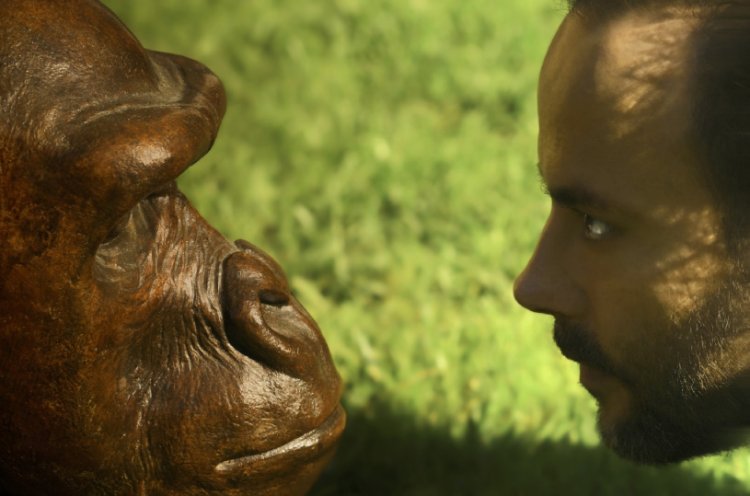The Strange Behavior of Water: 5 Thoughts to Ponder
Could humans really have evolved from apes? Which muscles take a break when we sleep? What protects a fetus from harmful substances in the mother's body, and why is it better to pray in a group?
 (Photo: shutterstock)
(Photo: shutterstock)Ape After Human
I suggest to those who claim that humans evolved from apes to visit the zoo and watch apes for a few minutes. From simple observation, it becomes clear that it's impossible for such a creature to develop into the most incredible and complex machine in the world - the human being.
To what can this be compared?
Suppose, for instance, that in your building's parking lot there is a car from 1770 (the year the automobile was invented). A real junker that can only move at 5 km/h and travel a few hundred meters at best. What do you think would be its condition if we checked it a thousand years later?
Can anyone seriously think that they'd find a Porsche, Ferrari, or Lamborghini, about 5 meters long, with a hardtop, 460 horsepower engine, automatic transmission, that can reach 310 km/h and accelerate from zero to a hundred in less than four seconds? Clearly, such a scenario is impossible; instead, the car would be more dilapidated, its parts breaking down, unable to drive at all.

Likewise, it is impossible that from an ape, a lesser creature with minimal capabilities, the most elevated of all beings on earth has evolved: a human - who thinks, understands, speaks, and remembers, with perfectly designed organs: the structure of the brain, the heart, respiratory system, digestion, vision, hearing, and more—organs that human hands had no part in forming!
Friends, humans possess uniqueness beyond intelligence and communication. They are endowed with a spiritual soul capable of thoughts and ethics, which no animal or computer can demonstrate. It's hard not to suspect that the belief of those "researchers" that there is no Creator of the world, heaven forbid, stems from the desire to do as they please, leading them astray from logic...
Organ Strike
Sleep is typically a state in which the body is inactive: body muscles are relaxed and not active, and special brain processes dull the sensory messages. Thus, if you try to make a sleeping person stand, they will fall; a sleeping person won't hear noises, and so forth.
However, note this: not all body muscles are relaxed and inactive. Surprisingly, all the muscles in our bodies critical for our function continue to work automatically during sleep without any control on our part. For example, the heart muscle keeps beating, the digestive system's muscles keep working, as do the lungs, among others.
Who created this "division of labor" in our bodies? How do the muscles "know" which should continue working and which should "strike" during sleep? How do all the organs that continue operating during sleep know—without exception—that they are all critical for human life? Could it be that this division was created "by chance"?
Furthermore, this division during sleep persists throughout life—there are no changes or "night shifts" among organs; every organ "knows" its role and responsibility, when to work, and when to strike. Here we see a lawfulness and a marvelous order!
The Anomaly of Water
As is known, the nature of all materials in the world is to expand when heated and contract when cold, meaning: as the temperature rises, the material expands and becomes lighter, and its volume increases, whereas as the temperature decreases, it contracts, becomes heavier, and its volume shrinks. This basic natural law governs all materials in the world without exception.
But there is only one material in nature that doesn't completely "obey" this law... What is it? Water!
Astonishingly, unlike all materials, in the temperature range of four to zero degrees Celsius, when water approaches the freezing point, it stops contracting! And as if that weren't enough, they then begin to behave as if they are being heated—they expand and their volume increases! How can this be?
 (Photo: shutterstock)
(Photo: shutterstock)It's a miracle! Without the miracle of water, the world would not exist! If water continued to contract when reaching the freezing point, and its volume kept decreasing like all the materials in nature, ice would be heavier than water, and it would of course sink. If the world's ice sank, during cold periods, the earth's underground waters in many places would turn into gigantic blocks of ice, and all aquatic life within them would die!
Moreover, without the "miracle of water," the Arctic Sea would freeze to its bottom each winter, and its vast expanses would become enormous ice blocks. When summer arrived, these glaciers would melt, creating enormous water streams that would flood continents and completely drown their inhabitants.
Isn't it a tremendous wonder? The only material that, for the survival of the world, must expand in the cold, contrary to the general law of nature, is water. Indeed, only water behaves like this, and it occurs only when its behavior according to the general law of nature would harm the world...
Only a superior intelligence, with unlimited ability, whose concern is so great for all living beings, could be the creator of such a sophisticated phenomenon...
A Sophisticated Filter
During nine months, the mother provides oxygen and nourishment to the fetus. I wondered what would happen to a fetus whose mother's blood contains harmful or dangerous substances, heaven forbid, like nicotine and alcohol? Is there no mechanism to prevent these dangerous substances from reaching the fetus's blood?
It turns out there is an organ that develops during pregnancy together with the fetus, whose main role is to allow the exchange of substances between the mother and the fetus. Meet the placenta.
The placenta is located on the uterine wall, and from it emerges the umbilical cord, connecting the placenta to the fetus's body, transferring food to the fetus and waste from the fetus back to the mother.
During pregnancy, the placenta supplies the fetus with oxygen and all its nutritional needs. The mother's blood vessels transfer oxygen and food to the placenta, where an exchange of substances occurs between the mother's blood and the fetus's blood without direct contact between them. The fetus absorbs these substances through the umbilical cord, and waste accumulating in the blood flows in the opposite direction for the mother to excrete.
Additionally, the placenta functions as a sophisticated filter, preventing the transfer of harmful substances from the mother to the fetus. In fact, even harmful substances known as "placental passers," like nicotine, alcohol, and certain drugs, are partially blocked by the placental filter, thanks to a filtering mechanism that routes them back into the mother's bloodstream.
Birth concludes only after the placenta, having completed its "negotiation link" between the baby and the mother, is expelled from the womb.
Who is it that so wonderfully preserves the life of the fetus and created for it a unique organ for the duration of its temporary stay in the mother's womb?
The Importance of Communal Prayer
"We'll meet tomorrow, I have to rush to the synagogue, I have Mincha prayer in an hour," I told my friend. "Pray here by yourself in the next room, why bother going to the synagogue?" responded my secular friend, who preferred I stay and continue working with him on our final degree project. "It’s not possible," I said, "Individual prayer is not the same as praying with a quorum." My friend looked at me with disdain, "It’s the same prayer," he said, "What’s the difference?"
So why is there actually importance to praying in a group? Isn't it better to pray alone without disturbances from those around you?
 (Illustration: Flash 90)
(Illustration: Flash 90)To what can this be compared? Imagine a father of ten children: in the first case, one son approaches his father alone and asks for help with something specific. On the other hand, in the second case, all ten children go together to their father and ask him to help them with... In which scenario, do you think, the father would be more moved and likely to grant their request—when a son approaches him alone, or when all the children approach together? The answer is clear: It is very hard for a father to refuse his children when they approach him all together... This is also the power of communal prayer.
There is great and immense power in prayer when the children of the Creator of the world unite and pray together in a quorum. May we all come to understand this, and join together as one group to fulfill the will of our Father in heaven and increase our prayers before Him, Amen.

